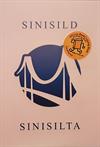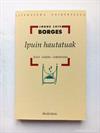
The Carhullan Army
2 journalers for this copy...
After a series of crises, England has turned into an authoritarian dystopia, where a colony of women at Carhullan lives on a self-sufficient farm outside society. The story follows one of these Sisters, as she escapes her town and makes her way into Carhullan, integrating into the world there.
When does one say "Enough!" and stops accepting her fate? For the protagonist, this happened, but we also see her struggling with the decision, taking her time to make it. It is easy to complacently fall into a routine, doing nothing differently, and letting life happen. Actively initiating a change, not even as major a change as here, can be a scary prospect, and this is a theme that continues throughout the book.
On the other hand, change is easy to accept if it comes gradually, without the need to do anything active, just hanging around passively without resisting. This is how dystopias are usually depicted as forming, and how the one in this book forms: a political will on the part of some, fortuitous circumstances that allow tightening of regulations, and an apathetic populace to permit the changes to happen.
At first, when I encountered some details of the society, it was hard to swallow. It simply didn't seem credible that a society like that could be built on what seemed like too-flimsy ground. As the story progressed and more of the backstory got filled in, this improved somewhat, as apparently there had been a “perfect storm” of crises. Still, it strains my suspension of disbelief.
Perhaps one reason for depicting the society as it is is to make note of women's situation. A way for tyrants to rule is to elevate one group above others, and make sure this group is large enough to contain any discontent. Here, the monitors are evidently one such group, but they seem small enough. In addition, as is also common, women make a suitable target, as then the other half of the population participates in the oppression: we see some of this in Andrew's complacency, his inability to understand the humiliation her wife has to go through.
Carhullan does not appear to be an idyllic paradise either. The view is distorted by the protagonist's unquestioning adoration of Jackie Nixon and her actions. Still, an abused woman comes in looking for shelter, and she just gets abused further. As is common, she justifies the abuse to herself, thinking it's not torture if they do not inflict physical pain. But it clearly is torture, intended to break her, to make her what her captors want her to be. I am reminded of a similar scene in V for Vendetta, where a young woman is also broken by torture, with the intention of making her stronger. Interestingly, later on we do see some after-effects of this treatment, as usual with this book: nothing is perfect, nothing is purely anything, but things have good and bad consequences.
Finally, as the story turns towards a military one, I could not help but be reminded of Starship Troopers, especially its training parts. The tone is very similar, the attitude of the viewpoint trainee is similar, but the glorification of the military does seem to be lacking here. Instead, the adoration is personified in the group leader. Is it simply a case of different authors, or is it because this book is about women, not men? Personification of the admiration would seem to be a stereotypically feminine trait, whereas an impersonal military more of masculine one.
This was what I got out of this book, but its real brilliance is in how it simply tells what happens and gives the protagonist's impressions. I can see how it would be possible to read this in several different ways, one no less valid than the other. In the end, what you get out of this book is partially what you come in with, and I hope future readers won't bother to fixate on my comments above too much but find their own truths.
When does one say "Enough!" and stops accepting her fate? For the protagonist, this happened, but we also see her struggling with the decision, taking her time to make it. It is easy to complacently fall into a routine, doing nothing differently, and letting life happen. Actively initiating a change, not even as major a change as here, can be a scary prospect, and this is a theme that continues throughout the book.
On the other hand, change is easy to accept if it comes gradually, without the need to do anything active, just hanging around passively without resisting. This is how dystopias are usually depicted as forming, and how the one in this book forms: a political will on the part of some, fortuitous circumstances that allow tightening of regulations, and an apathetic populace to permit the changes to happen.
At first, when I encountered some details of the society, it was hard to swallow. It simply didn't seem credible that a society like that could be built on what seemed like too-flimsy ground. As the story progressed and more of the backstory got filled in, this improved somewhat, as apparently there had been a “perfect storm” of crises. Still, it strains my suspension of disbelief.
Perhaps one reason for depicting the society as it is is to make note of women's situation. A way for tyrants to rule is to elevate one group above others, and make sure this group is large enough to contain any discontent. Here, the monitors are evidently one such group, but they seem small enough. In addition, as is also common, women make a suitable target, as then the other half of the population participates in the oppression: we see some of this in Andrew's complacency, his inability to understand the humiliation her wife has to go through.
Carhullan does not appear to be an idyllic paradise either. The view is distorted by the protagonist's unquestioning adoration of Jackie Nixon and her actions. Still, an abused woman comes in looking for shelter, and she just gets abused further. As is common, she justifies the abuse to herself, thinking it's not torture if they do not inflict physical pain. But it clearly is torture, intended to break her, to make her what her captors want her to be. I am reminded of a similar scene in V for Vendetta, where a young woman is also broken by torture, with the intention of making her stronger. Interestingly, later on we do see some after-effects of this treatment, as usual with this book: nothing is perfect, nothing is purely anything, but things have good and bad consequences.
Finally, as the story turns towards a military one, I could not help but be reminded of Starship Troopers, especially its training parts. The tone is very similar, the attitude of the viewpoint trainee is similar, but the glorification of the military does seem to be lacking here. Instead, the adoration is personified in the group leader. Is it simply a case of different authors, or is it because this book is about women, not men? Personification of the admiration would seem to be a stereotypically feminine trait, whereas an impersonal military more of masculine one.
This was what I got out of this book, but its real brilliance is in how it simply tells what happens and gives the protagonist's impressions. I can see how it would be possible to read this in several different ways, one no less valid than the other. In the end, what you get out of this book is partially what you come in with, and I hope future readers won't bother to fixate on my comments above too much but find their own truths.
Thanks for giving the book to me on a BC meeting. The way this novel seems to handle fanaticism through an all-female community sounds highly interesting (judging by the back cover).







